Don't wanna be here? Send us removal request.
Text
Out of Place Meets Out of Time
The book of Acts packs punches the way a lightning storm blankets a beach: at first in slow strokes, then in cannon fire flares across the sky. My favorite theme is God’s timing and purpose for each of the early Church makers. Specifically, I’m astounded at the way God can use our feeling of “lost” to make others found.
Stephen the Saab
Have you ever noticed when you buy a new car that you suddenly see dozens of your car, daily? You never noticed how common the thing was until your were primed to recognize it. Acts 6 positions Stephen as the prized Saab among the seven servants. “Stephen, a man full of faith and of the Holy Spirit...,” “full of grace and power.” Of the seven, we are trained to focus on Stephen. That additional comma says, “Pay attention to this guy. He’s special.”
Stephen was one of the few who said, “I will stay behind and serve, locally. I’ll take care of this corner of the universe.” While doing so, he preached. He performed “great wonders and signs among the people” (v. 8). Though the skeptics tried, verse 10 tells us they “Could not withstand the wisdom and Spirit with which he was speaking.” When Stephen was tried, the council saw that his face was like an angel. The glory of God was literally written on Stephen’s face.
So, why did he never resent his tiny corner of the universe? How easy would it have been for Stephen to say, “I’m called, and I’m chosen. I preach with wisdom and lead with influence. Why am I stuck in Jerusalem while the Apostles are preparing for Antioch? Am I not worthy of such a charge?”
The power of Stephen wasn’t held back by his placement with the seven. The power of his placement fulfilled his purpose. Mighty Stephen was the first of the martyrs. As one of my pastors said to me, “Stephen’s first sermon was at his funeral!” And perhaps, the most amazing thing of all is this: God used Stephen to bring about Paul.
A Certain Saul of the Sanhedrin
How does a Tarsus artisan, son of a pious man and Roman, dropped in the middle of the Sanhedrin in the city of Jerusalem, this Pharisee who could not see til nine, grow up to be a Stoic philosopher?
(If you haven’t seen Hamilton, just reread that and add it to your List. Thank me, later.)
How did one of the most zealous persecutors of Christians become the most well known missionary of the first century and beyond? How did the man who administered the death of Stephen come to be one of the most read authors of all time, contributing 13 of the 27 books of the New Testament? Paul is living proof that no man is so far from God he cannot be saved.
It would be easy for us, as readers, to ask of Saul, “Where were you? When Jesus’ every promise was fulfilled before your eyes, you put Stephen in the pit. When the Heavens opened for him, you entered homes to slaughter believers.” Paul himself knew his conversation was unconventional. “Last of all, as though I had been born at the wrong time, I also saw him” 1 Cor. 15:8).
The reality is, Saul wasn’t falling behind or running late, he was lying in wait-- the kind of “wait” that only God can use. For every oppression of the apostles, there was one in the shadows, observing. When the court officials spoke against the apostles in Acts 4, Saul was there. And when the opponents of Stephen induced men to speak against him, who was there to witness it but Saul of Tarsus? God used Saul’s position in the Sanhedrin to write the script of history.
Before Stephen died, the witnesses laid their clothes at the feet of Saul. Stephen prayed, “Lord, do not charge them with this sin.” The conversion of Saul is evidence of the answered prayer of Stephen. If Stephen had left with the twelve instead of serving with the seven, there would be no stoning. If there had been no martyr to pray over Saul, the Church would not have had Paul.
The next time you feel like Stephen, out of place, or like Paul, out of time, remember God has you exactly where He needs you.
#christian#christianblogger#journal#book of acts#paul#saul#stephen#martyr#saint#saint stephen#early church
0 notes
Text
The Day After George Floyd Was Murdered
I wonder: What would it be like if I woke up, a little black girl, The day after George Floyd was murdered?
Would tears rush to my eyes Before they mange to open? Would I have slept at all?
I wonder: Would I get out of bed, and ask, “What’s the point if I don’t make it past today And the only thing I am ever known for Is the way that I die, on national television?”
Would I bathe and loathe my skin For doing nothing But existing in the wrong State, Context, Street Corner, School?
Would I stand in the mirror With shaky breath and palms, Forging a faltering smile? Could I fake it by recalling that my Resting bitch face is punishable by death?
And when the crossing-guard officer Shot out a hand to wave our usual “Good mornin’!” before school, Would I flinch from the gun on the same hip That hand came from?
I wonder: Could I bring myself to Keep a level head and Find ways to get ahead, So I’m less likely to wind up In the same ‘hoods that make the headlines.
Could I bring to the forefront of my mind Some calculation on the dry-erase board And still reconcile the odds Of a visit to the C-store And a happy ending?
And when the rioting began Would my first instinct be “That doesn’t solve a thing,” Or, “Oh God, nothing ever will.”
Could I, For one moment, In the entire day, Breathe?
But I did not wake up, a little black girl, The day after George Floyd was murdered.
I woke up, a little white girl, Who still doesn’t understand What it’s like to be targeted Instead of broken-hearted.
#sayhisname#black lives matter#protest#I can't breathe#say their names#say his name#George Floyd#minneapolis#privilege#white privilege#police brutality#target#target riot#racism#poetry#the journal#journal#black and white#injustice#oppression
9 notes
·
View notes
Text
A Spoon Full of Sugar
Award-winning cinematic shots are pacing shots. Montages bring progress without the painful process. Slow-motion adds a dash of tension with a sweet taste of leisure. Passage of time is one device cinematographers use to manipulate the viewer’s attachment to the story.
Reality feels a lot like these loops, right now. Our nation is under quarantine, attempting to stop the spread of a global disease that acts like the flu but is twice as deadly. Now that the initial hysteria and mayhem have settled, so have we. The earth is responding positively to this change of pace. One twitter account, @hell0pia lists such results: "Citizens of Wuhan can finally hear birds chirping after years, Venice’s water canals are clear and full of fish, and you can even see the Tatra mountains from Kraków because the smog has lifted. This isn’t an apocalypse. It’s an awakening.” I even saw a beautiful illustration on my friend’s Instagram account of God holding a sick Earth in His arms, displaying His care over us.

I’ve never been a “glass half full” kind of person, but it is impossible for me to ignore the beautiful little morsels of positive impact. Despite the cause, there are families across America savoring formerly lost time with each other, and spiritual leaders finding revelation in rest. For the first time in a long time, we have no choice but to slow down. For many, there is no foreseeable due-date nor deadline. There are just unmeasured passages of time, and freedom to fill them as desired. This morning during my workout on the porch, I afforded an opportunity to close my eyes for a beat—birds chirping, dogs barking, trucks passing, and wind whipping branches, playfully. Kinetic energy riddles the air; life extends to dying motivations; sweet waters fill the dried riverbeds of relationships. With the springtime, the earth is returning to herself.
A slower pace was just what the doctor ordered— and a spoonful of sugar helps the medicine go down.
#covid19#coronavirus#blogger#journal#twitter#film#movies#sugar#flavor#bright side#glass half full#awakening#spiritual#church#god#exercise#apocalypse
0 notes
Text
Sequestered, Not Quarantined
At present, there are 78 confirmed cases of COVID-19, a disease caused by a new-to-human coronavirus, in the state of Alabama. There are 11.2 thousand in the nation, and 238 thousand in the world. Until this year, not many people tossed around “coronavirus” as a household term, yet it was right under our noses. Some surface cleaner bottles read “protects against coronaviruses,” typically resulting in the common cold. Funny how something so mild can escalate to a global crisis. For a pesky little word hidden away on a shelf, it has become the most pervasive term in the human vocabulary over past weeks.
Sterile utterance of the words, “unprecedented” and “fluid” give way to fear with every email and press release or conference. I am from the generation that grew up with 9/11 and two recessions. Yet, no living person has seen anything like this. We are quarantined— okay, not formally. We are “socially distancing,” while making memes about our quarantined struggles and devouring social feeds of delicious comedy and terror. We’ve seen a lot of things, but never been held hostage to our homes in the middle of springtime. In the season of new life, death runs rampant. I have never felt so deafened and silenced.
Through mass shut-downs, federal and state mandates, and extreme measures we are confined to tight spaces with limited-to-no physical contact. We have nothing to do but scroll through an overdose of virtual updates. If I’m honest, online is a scarier place to be than a crowded restaurant. Nine of ten Facebook posts are virus-centric. It’s as if we’re all in a tailspin, trying to make sense of how to act in a time like this. Parents are confiding their homeschool heyday stories, and business owners are capitalizing on limited resources, selling toilet paper with vehicles. I don’t fault them for it. The reality is, no one profits from this disaster; we’re all doing our best to survive.
In this avalanche of communication, I feel as if my voice has no place. If I speak, it would be one of three things: another unnecessary Google alert for the medical community, a joke told one too many ways to be funny anymore, or a redundant warning we’re tired of hearing. There is nothing anyone can say or do to remedy the ramifications of this pandemic.
However, despite the chaos, I cannot believe it is without meaning. There is reason in this madness, when I take a cue from court, and quiet the noise. Every so often, when a case can be swayed by a biased jury, the jury undergoes a process of sequestration. Through sequestration, they are barred up in hotels and removed from media. No newspapers, TV or cell phones allowed. The goal is to remove the jury and protect it from outside influence, so that they can hone in on the facts of the case and decide with a clear conscience the proper verdict.
To diffuse the noise, I don’t need to be quarantined. I need to be sequestered. In order to build a game plan, I require a new perspective. It won’t be found on a timeline. It is found in constant prayer and revelation found in Scripture. When I zoom out of the viral buzz, and lean into the words God wants me to hear, I have a broader view of the outcomes. Through this experience, church services will be canceled. Somewhere, somebody who gave up on church long ago will find the convenience of watching a streamed sermon in his PJs. He, and countless others will find revival in their relationship with God. If the cure for cancer is not yet out there, it’s living inside the kid who is following every live update from the CDC today, and later commits his life to disease research.
Every moment is too precious to waste. What can I plant today that will support industry three months from now? How can I be a continued advocate for essential service employees in the battlefield? I believe God has a purpose for this pandemic, and my place within it isn’t sitting back and waiting. Like a jury, I don’t want to be quarantined. I want to be sequestered, so I can strategize the next move for the next season.
0 notes
Text
Shout About
Remember the first movie you loved? Did you grow up on Disney princesses and villains that never stood a chance? To be truthful, I always identified with the princesses. I felt I was as beautiful, desirable, treasured. I possessed wild ambition and confidence as a kid, and boy, am I grateful to have lived in that time. Before the anxiety-inducing black mirrors permeated our existence. There was a time when a kid’s self esteem came from victories on the playground, the approval of parents’ and acceptance from school friends. There was a time when a person’s value somewhat belonged in the hands of others, but Others were the easiest thing in the world to shut out. Kids could go home at the end of the day and cower in their beds choosing which monster to fear: the one in the closet, or Megan from Math Class. The bullying ended with the afternoon bell, and we were safe for another day. Unfortunately that’s not the case, anymore.
We, especially as young people, are constantly seeking some hierarchal position above, if not among, our peers. There’s no such thing as quiet time and learning to love oneself in the silence. There are too many voices. Every given moment, a heart shaped icon holds the power to worship or dethrone, by the hundreds and thousands. The pranks in the cafeteria were temporal; the slander, shaming and shut-outs are permanent. They can be deleted, but once posted are permanently housed somewhere in the enigma of “the cloud.” If the hate of our world were stored in the clouds we see, instead of the ones we pretend we understand and control, we would no longer lie in peace on a fair-weather day, wouldn't dream and guess at their shapes. We would turn our eyes, afraid more of cloud damage than the sun’s own rays. The voices are countless, constant, catastrophic.
There was always one thing I lacked, when I compared the princesses to myself. A voice. I would watch the Little Mermaid on loop, and always beg the question, “Will I hit the note this time?” I was a terrible singer, and fully aware of it. But, if Disney taught me one thing, it’s that you’ve gotta know how to sing to get the prince. I prayed and I begged for God to make me sing. I remember an exact moment in my bedroom that I truly felt the presence of the Holy Spirit with me. I bribed Him. “Please, give me a voice. I will never ask for anything again, just give me the voice.” In that moment, I truly believed it would happen. At some point, it wasn’t even about the prince anymore. It was a desire to captivate an audience, to cultivate friends, to share a gift with a world ready to listen.
Over the years, I was told by relatives that “no one in our family can sing, so don’t even try.” I was hushed when I would sing out loud. Part of me became so self conscious that to this day I hold no confidence even in dancing. Musical expression is clearly no talent I posses, so I revel in it privately. Just like every other teenage rockstar wannabe, I found—find, my sanctuary in the shower with my shampoo bottle microphone. As time passes, that memory washes over me in waves: during worship at church, and when my now mediocre melodies find their place among the lyrics of simple songs. For years I have asked God and myself, “Why do I even remember that prayer? Why do I even remember getting on my tip-toes, thinking, ‘The closer I am to this corner of the ceiling, the more likely God will hear my words?’ What good was that whisper that brought me no answer?”
It has taken me a long time and the wisdom of greater spiritual leaders to recognize that moment for what it’s worth: a true moment of divinity. God answered my prayer. I don’t know that it was that day— in truth, I don’t know when it really happened. All I know is that somewhere right before I graduated high school I became surrounded by people who praised my vocal strengths, not in song, but in speech. I have been told that I take command of a room with my words; I “carry myself with such a spirit that people want to listen.” Perhaps the greatest compliment of all is this: “Your words have such authority.” God gave me a voice. He bestowed to me a spiritual authority by might of tongue and mannerism. It is truly laughable that He picked a true-blue Alabama girl like myself to bring a Word and witness. Yet, the purpose is undeniable.
We are living in a word filled with the voices of dull, throbbing headaches and heartbreaks, and like an addiction, we keep them in close company. There are few things I know of my purpose, but this one I hold, steadfast: In the name of Jesus Christ, my voice will reign. His words of truth and mercy will flood into the cracks of the broken, fill and restore them from small pressure to total release. His will shall conquer what the Devil believes he has destroyed. I am but one of many voices God has placed in this time for this reason. It is time for His ambassadors to unite and conquer for once and in a great series of “once agains,” until He returns. The battles will will be many, and exhausting. The “for all” will come, but it is the mantra of my purpose to stand and proclaim that we fight FROM victory, for the war has been won. Isn’t that just something to shout about?
0 notes
Photo

#poem#poetry#journal#thejournal#graphics#religion#spiritual#jesus#god#peace#anxiety#calm#ink#nanowrimo
0 notes
Text
Your Crooked American

"O stand, stand at the window As the tears scald and start; You shall love your crooked neighbor With all your crooked heart.”
— “As I Walked Out One Evening,” by W.H. Auden
Who is my crooked neighbor? They are far easier counted than friends. Yet, I know a neighbor who counters all crookedness in the world. There is a man who is mighty in intellect, humble in expression. He feeds on the laughter of the world, likes to watch it glow and grow warmer. He understands a thing or two of unconditional love— in part, it’s his nature. In part, it’s his culture.
My best friend’s name is Aljon. Born in the Philippines and quickly wound through the American wheel, he found himself the permanent resident of small-town Alabama. Aljon has maintained a unique identity, keeping me up to speed with the latest pop culture trends, effortlessly navigating the gif bar while stirring pancit. He speaks unbroken Tagalog and English, honors his mother; he stands, the pillar of his family, while earning a degree and poring over endless editions of his latest manuscript. He has deadlines to meet, goals to achieve, and selflessly juggles each underneath the family table.
Aljon taught me in the ninth grade that Filipinos always remove their shoes before stepping inside a residence. An American brat myself, I never complied in my own home. Sneakers propped atop coffee tables, mud dripped into too-worn carpet. All the while, Aljon insisted his shoes be left outside to the elements. I never understood why it mattered so very much. It was like asking your parents if company could come over.
“No, the house is a wreck.” “Mom, nobody cares how your house looks!”
But Filipino culture exhumes respect I have never exemplified enough.
According to custom, most people of ancient Asian descent lived in homes built above ground. The homes were lifted, in order to create ventilation in the home. To step up into one's home was to enter someone’s private and sacred space. Therefore, off with the shoes. Furthermore, shoes separate your feet from the dust of the day. In many Asian societies, life is best lived in the floor. Meals, family gatherings, even sleep take place on the ground. The floor, while the filthiest and least desirable space in American culture is sacred ground to others.
My point: Aljon comes from a long line of servant leaders. They cultivate such integrity and celebration of life. Rarely, however, is such behavior rewarded.
On September 3, a disgruntled customer entered the doorway of Aljon’s family store— shoes on. He rapidly approached Aljon, the fiercest wordsmith and softest speaker I know. I picture the man disheveled, tracking mud through the brand new flooring Aljon’s family sacrificed everything to build. His first words? “What are you?” He interrogated Aljon, demanding legal documentation, denying his citizenship with a sliced, “You don’t look Filipino.” This racist attack left my friend feeling “less than human.”
This wasn’t the first time Aljon has experienced such trauma. Weekly, he faces verbal challenges of the greatest disgust, and in the unlikeliest of places. In times like these, I’m reminded of the Biblical ceremony of foot washing. Jesus would frequently be seen either having his feet washed by common people or lowering himself to wash the feet of his disciples— he did so in devotion and service. Jesus, the Light and Savior of the World, made himself beneath us, that we might love one another. And yet I don’t have the common decency to remove my shoes. This stranger wouldn’t know the first thing of servanthood if it struck him in the face.
Aljon, on the other hand, has always turned the other cheek.
“If you love those who love you, what credit is that to you? Even sinners love those who love them. And if you do good to those who are good to you, what credit is that to you? Even sinners do that. And if you lend to those from whom you expect repayment, what credit is that to you? Even sinners lend to sinners, expecting to be repaid in full. But love your enemies, do good to them, and lend to them without expecting to get anything back. Then your reward will be great, and you will be children of the Most High, because he is kind to the ungrateful and wicked” (Luke 6:32-35).
Aljon is the king of loving his crooked neighbor with all his crooked heart.
As an American, it is easy to entertain the threat of immigration narratives. It is easier to believe that someone is out for your job, spending your taxpayer dollars, sleeping on a pile of cash, than to face the realities outside the media agenda. It is far easier to tune out and turn off than to reach out and bring in, when fear resides in our hearts. Deuteronomy 10: 18-19 reminds us that "He defends the cause of the fatherless and the widow, and loves the foreigner residing among you, giving them food and clothing. And you are to love those who are foreigners, for you yourselves were foreigners in Egypt.” We were all once foreigners. Foreigners who took what did not belong to us and built upon it an empire of exclusivity. I never want to miss the opportunity to be made a better person by persons of love, honor and service, no matter the color they may be.
#racism#christian posts#jesus#religion#discrimination#asian#culture#b&w#journal#thejournal#bible#american dream#america#citizenship#immigration#auden#poetry#politics#filipino
0 notes
Text
Twin-Sized Dreams, King-Sized Realities

A whirlwind passes, sweeps away countless victims. It’s gut-wrenching, mind-fogging, all out warfare. It’s gorgeous. It’s catastrophe making violent love to freedom. It’s college, and it’s the point when life begins.
The years 2012-2016 brought me the widespread nicknamed “best four years of life.” From the first wind-wandering steps across a ginormous campus to friendships forged in equal parts fear and love, the pathways of the University of North Alabama knotted themselves into my veins, became my DNA.
Many inquire about the formative stages of life: When did you know who you wanted to be? What you wanted to do? Where do you see yourself in ten years? Each of these questions were firmly rooted by days that I tread through worn-floored hallways and latched onto the wisdom of professors of life, forgetting they were professors of curriculum along the way.
Now, as I sit in my too-large bed, counting my blessings and planning the life still to be lived, I feel powerful. I am hooked into the unconscious pledge of ever-after by my husband’s arm slung around my waist. I feel a soft laugh coming on, stifle it, lest I wake the jumpy cat at the foot of the bed. Gratitude washes in waves.
Every one of God’s promises —I will take care of you. I have equipped you with everything you need. You thrive because I call you brilliant— every one of them has proven true beyond my wildest expectations. I know that I am on the up-and-up. And yet. What’s that Office quote? “I wish there was a way to know you're in the good old days before you've actually left them.”
Once in a while, my first house feels a mansion-fort I can’t hold down, days spill out of my hand, and I’m reminded that, while life is good, I am fretfully mortal. It is in moments like these that I wrap myself in silence and sink into yesteryear. I prefer the step ladder of a cinder-cell dorm bed and climb up to my twin-sized fortress. I feel the presence of my first roommate arms-length away, the warmth of walls I hold no responsibility for maintaining. I dizzy myself with daydreams of maddening youth: colorful parties and dancing in parades.
In reverie, I twirl through relationships loved and lost, and how my heart aches for them. How my soul yearns for simpler times and golden hours. Above all, I cannot conceive of the idea that these things once belonged to me, and that, somehow, the best four years were replaced with better ones yet. A new day dawns.
I close my eyes against the weight of joy, draw a breath that commits to life. There is so very much I owe to the elders and peers who brought me here. So many things I would never have known, cherished, and claimed my own, if not for you. Let my life be a testament that, through divine intervention, the world is not lost. People truly take care of their own. And, with the right combination of confidence and luck, twin-sized dreams become king-sized realities.
#college#the office#Andy bernard#journal#blogger#christian blogger#god#religion#prayer#university#uni#career#job#graduate#memories
0 notes
Text
“Pray to end abortion.”
“Pray to end abortion.”
This was the bold lettering stamped across a church marquee I recently passed, on my way to another inconsequential meeting I had given no prior consideration. The gravity of that message, on the other hand, rapped at my spirit, and shook me to my core.
Pray to end abortion. “Pray to end the premature deaths of both perfectly healthy and still some non-viable unborn children.” At least, that was, I’m sure, the purest intent of this sign.
Maybe it’s because I profess to be a Christian growing up in the Bible Belt that my ears have sadly numbed to the common declaration that those who receive abortions are “baby killers,” “evil in spirit,” the worst kind imaginable. Every day, I can be reminded how horrific these sinners are by logging onto twitter-dot-com for my daily giggles, only to be convinced that hatred and ignorance run rampant in our society.
Pray to end abortion. My question for that church and for the Church is this: Why stop there?
Pray to end situations that land a woman in such a critical place. Pray to end rape. Pray to end perversion of sex. Pray to end the perception that sex is power, and he who possesses it is god of his own body. Pray to end the shell-shocking fear which leads the woman to believe there is no one who will support her through this life-altering decision. Pray to end her inability to care for a child or see a hope for a future in that child’s life. Pray to end the hypocrisy of “believers’” rally cry against her. Pray to end the disconnect between believers’ proclamation of our holiness and our total failure to recognize our own wicked nature.
I too, am evil in spirit. I too, am undeserving of the gift that is my own life.
And yet, grace brings me in.
Too often, brokenness shouts louder than joy. Christians are quick to condemn the sins we see in others, while refusing to share the opportunity for grace which is available for all.
We grow comfortable in the lie that by accepting Christ, we have become deserving of the holiness He bestows. We are graciously adopted, and yet we taint the concept of adoption with the quip, “That’s what the unborn child needs! Adoption!”
Scripture charges us with the sole purpose for adoption in Christ: “Go and make disciples of the nations.” I don’t speak Greek or Hebrew, so correct me if my translation is wrong. There is no place in the Great Commission for the reservation and silence of salvation for ourselves. There is no commandment supporting the exclusion of the lost from our circle of privilege.
Far too long we have praised pastoral proclamations from the pulpit while refusing to step out into the battlefield for others, to win the war for Life. If a city on a hill cannot be hidden, neither can the genuine love of the King’s sons and daughters.
Tonight, when I pray to end a number of things, my prayers won’t be restricted to the protection of the aborted. I pray for an unseen generation to be brought forth boldly and intentionally, I do. But I beg that my prayers never fail to reach the brokenness that results in abortions, in torn families, in lost identities. I pray that my gift of life and grace can be sent out as a declaration of my Creator, the giver of live and life to the fullest.
#abortion#christianity#religion#grace#controversial#christian blogger#Bible#God#Jesus#social justice#social issues#journal
0 notes
Text
Married with Schooling
Nelson Mandela said, “Education is the most powerful weapon you can use to change the world.”
At least, that’s what I was always told. At least, that’s the reason I have dedicated my life to education. There’s something addictive in learning, in storing up knowledge in your head. It’s a weapon, alright. It’s an olive branch. It’s a sexual advantage and still socially debilitating. Education is a down-payment to secure our place in this world. It is thus heartbreaking that 39 percent of the world’s poor never receive this precious gift.
And still, this prize I cherish, obsess over, and harbor requires more sacrifice of me than I ever agreed to give. It’s come for my self-confidence often and my energy more times than I can count. But this time, it’s personal. This time, it has come for my marriage.
Since graduation, I have thrown myself into bits of education: continuing ed courses, church based theology studies, and local strategy workshops. But all of it pales in comparison to the beast my husband has tackled since taking me as his wife. My husband is enrolled in a Master’s program; at the same time, he’s pursuing the most significant certification in his field. His goal is not only to better himself, though he’s even bettering his team at the office in doing so. He’s improving our situation as the tiny family we are and will continue becoming.
I am enamored with him. He studies for 20 hours a week, on top of a 40+ hour work week. He’s brilliant, sharp as a tack, everything I fell in love with, only richer in knowledge and wisdom. He’s also exhausted, disconnected, and I see a little less life in him with every passing exam. It’s nothing to pity; in fact when he reads these words he’ll probably be mortified I shared them publicly. (Marry a writer and you silently agree for your world to go public). This struggle is something he conquers, daily. Education is a parasite. It takes as much as it gives, particularly in a marriage.
When two people come together under one covenant and roof, life has a way of piling responsibility on top of responsibility, burden on top of burden, and none of it resolves itself while we study. Many nights we are lucky to share a room until “lights out.” There are conversations that get tabled, forgotten, then never discussed at all. Stories, jokes and all luxurious lightness are sidelined for gravity and focus. While enrolled in these programs, warmth is worked for like rubbing sticks together in frosted woods. Happiness is cultivated mostly from memory and visions of the future.
Educational attainment is as I have said— a gift. Prize. Weapon. It is battled, vanquished, yet never satisfied. Both invaluable and inviolable. Its price of sacrifice is not to be pitied or grieved, nor complained about. Yet, we as Americans spend so much of our time doing just that. We take for granted that education is as accessible for most of us as the (mostly) clean water we drink. Like the individual, marriage is made stronger when subjected to ongoing education. It is better qualified for the challenges to come. However, the marriage shouldn’t be neglected but supplemented by education.
My request is simple:
Pray for and encourage your married friends in school. They’re struggling. Some have never known their relationship without silent nights spent at the same table.
Invest in education regarding your marriage, not just your career.
Love and unity are the other most powerful weapons we can use to change the world, so they must be protected. Just as we can study growth in market trends, we always have more to learn about keeping our covenants pure.
#marriage#relationship#school#uni#education#nelsonmandela#philosophy#advice#couple#love#unity#church#god#fellowship#study#journal
1 note
·
View note
Text
What is God’s “Best and Final?”

Brandon and I are house hunting. So far, I’ve learned it can be an exhilarating and surprising pursuit, filled with adrenaline rushes and natural highs of the highest state. I’ve also learned that it is heartbreaking, tormenting, discouraging. It can fill you with hope, and it extends doubt an invitation to consume you.
Was I naïve to think I could win a dream?
I’m putting everything I have into this process.
This home felt like ours.
What happens to the phantom kids I saw running circles around my kitchen
and leaving greasy fingerprints on whitewashed walls?
For months we’ve searched online for the perfect starter house—a fixer upper, something we could craft, together. Something to illustrate how brilliantly the two of us have come together as one, over the past two years. The perfect house would emulate our creative flair, marry our talents and interests, and discipline our disputes into healthy resolve. It would serve as a testament to the solid foundation of our marriage.
When I was a kid, I read a book about a girl who wanted to buy a horse. Her father warned her not to fall in love with the first horse she saw, to really keep her options open for the absolute best. I don’t remember the story; I just remember she fell in love with the very first one.
I had a similar, but reversed experience while wedding dress shopping. I had ideas of what the perfect dress might be. If you know anything about internet expectations versus reality, you won’t be surprised that I quickly displaced my internet-dream pile and nervously gathered gowns I’d never considered. On dress number seven, I found “it.” The dress was flared, regal. It had gold filigree down the bodice, and made me feel like a princess out of place. It just wasn’t mine. It wasn’t white, the bold color of a pure bride waiting to be given away for the first and final time.
Discouraged, I unclenched my fingers from the fabric of quinceañera fantasies, and took one glance at the remaining dress in my changing room. “Okay, God. This is it. If I’m not meant to buy the ‘Golden Grandeur,’ you better let me know.” I prayed with my eyes shut as I laced myself into the satin mermaid ensemble. It was only when I opened them before the mirror that I found myself in the dress I would stain with ocean waves and sand on a windy November day, next to my very best friend. In that moment, the “Golden Grandeur” became a frock.
Six houses fit into the palm of my hand on the first Saturday of our very own hunting season. Like my dresses, two of the houses were at the top of my radar, and I saved them for last. The first of the two felt large for such a small family. The second was probably the scene of inspiration for Poe’s “The Pit and the Pendulum”—definitely not a home. There was one final listing in our pile of possibilities. Nobody could remember how it got there—neither my husband nor the realtor remembered adding it to our list. We walked in, and I immediately felt taller, supported perhaps by Cinderella’s slippers. It was a perfect fit.
For days, I envisioned gatherings with our closest friends, the space most conducive for our cat to play, and I dreamed of babies mixing cookie batter in my kitchen beside me. When I think about that house, I can still hear the laughter that would fill its walls, and feel the warmth that would sink into the carpets on holiday evenings. We put in our first offer, below asking price, but reasonable. Two hours later we were told that multiple offers were submitted and the realtor needed our “best and final offer” immediately.
We scrambled to determine what the house was worth, to us. Was it worth playing conservatively, and avoid betting against ourselves? Was it worth paying more than we should in hopes of securing a glorified dream? In those moments of insecurity, I embraced God fiercely.
I prayed our future house might be one that serves Him—one filled with memories and laughter, joy and growth. If this house wasn’t for us, wasn’t productive to his ministry, I didn’t want it. We settled on our “best and final offer,” and surrendered the outcome.
We waited anxiously for the next 48 hours. God showed up in those moments. He reminded me who he is and what he’s done. He reminded me that the couple who lands in that house might not have half the marriage of my husband’s and mine. The buyer might not have the trust in his realtor that we do. Any structure we call our home will be our place of refuge. Any walls can be used for hide and seek and messy finger paintings when God has placed it there. I was not in control of my temporary situation, but the God of my final destination would provide. There were many factors surrounding the situation that could result in a loss for us, but God constantly lifted me with the notion that even to lose this house was to gain.
God isn’t like us. He doesn’t give his best and final offer just once in a scared attempt to convey his commitment to us. God promises his best and final offer, daily. In the beginning he extended the best and final offer when he chose to create us—God didn’t need companionship, and yet he chose to uniquely design and keep us for his own. When we made a mess of creation, he didn’t have to save us from ourselves or from the broken world of our establishment. Still he sent his best and final offering through Christ Jesus to break every chain. In the real estate world, “best and final” means “Where do you draw the line?” God’s answer is always, “I don’t.” When we surrender our desires to his will, we find that the only best and final offer of value in this world is not of this world—it is the ultimate resting place in our savior.
#god#journal#ink#letter#mythoughts#house#fixer upper#homeowner#house buyer#first time home owners#prayer#wedding#wedding dress#edgar allan poe#poetry#marriage#relationships#home#interior deisgn#chip and joanna
4 notes
·
View notes
Text
What’s Your Bloodshed?

For so long, I have questioned why the Bible takes such time detailing ritualistic sacrifice. Do we really need to know the gory details of splitting spleens and splashing blood? If the Burnt Offering was put to rest by the New Covenant, why was it so important to God?
The book of Leviticus explains the Old Testament process for sacrifice:
Animals
“(Leviticus 1:3) If the offering is a burnt offering from the herd, you are to offer a male without defect. You must present it at the entrance to the tent of meeting (the Tabernacle) so that it will be acceptable to the Lord. (4) You are to lay your hand on the head (get involved) of the burnt offering, and it will be accepted on your behalf to make atonement for you.”
Grain
“(Leviticus 2:1) When anyone brings a grain offering to the Lord, their offering is to be of the finest flour. They are to pour olive oil on it, put incense on it (2) and take it to Aaron’s sons the priests. The priest shall take a handful of the flour and oil, together with all the incense, and burn this as a memorial...”
In each illustration, it is noted that the sacrifice produces “an aroma pleasing to the Lord.”
If you can survive the initial churning disgust, it might confuse you to know that the burnt offering was a blessing to provider. The writer of Hebrews tells us the truth about burnt offering: It foreshadows the ultimate and final sacrifice of Jesus Christ.
“(Hebrews 9:12) He did not enter by means of the blood of goats and calves; but He entered the Most Holy Place once for all by His own blood, thus obtaining eternal redemption.”
“(v. 14) How much more, then, will the blood of Christ, who through the eternal Spirit offered himself unblemished to God (without defect; the finest flour), cleanse our consciences from acts that lead to death, so that we may serve the living God!”
Upon death, Christ did not enter in to the tabernacle made by human hands (though Lord knows they spared no expense expounding its brilliance), nor by the atonement of earthly blood. Those were only copies of the glory of the true tabernacle: the Kingdom of Heaven, open to those who accept His sacrifice: His blood shed for us.
God speaks to us in tangible ways. He understands our comfort in patterns and adoration for check-lists. He knows us so intimately He weaves his plans into our daily routine, while our hands have no idea what He means them to accomplish.
The old law commanded ritual sacrifice so that believers would also experience the anguish He would endure through the sacrifice of His son. His followers understood the power of Jesus on the cross, because He conditioned them in a world of relentless sacrifice. When all was said and done, Christ released them from their sins under the old law, and relieved them of the labor of continued bloodshed.
What toilsome inconvenience is God using to remind you of his sacrifice and the power of obedience?
0 notes
Text
A Skeptic’s Take on 2017 IT.
Hello, moviegoers! This is my first attempt discussing an adaptation/remake, and I’m trying my hand for one reason: Stephen King deserves the box office love he’s getting, but his fans deserve The Conversation: What happened to the IT we know and love? This skeptic, purist fangirl holds with optimism: It just. got. better.

In its second week running, IT still tops the chart grossing more than $218 million. This is hardly a review, just a structured attempt to explain the differences, the subjective pros and the cons.
1) The Lucky Seven aka The Losers Club
The casting for these kids was brilliant, with Finn Wolfhard (Richie), Jack Dylan Grazer (Eddie) and Jeremy Ray Taylor’s (Ben) performances shining through. I would like to have seen stronger identity and development through Wyatt Oleff (Stanley) and Chosen Jacobs (Mike), but altogether the group chemistry speaks for itself. The Losers Club is reminiscent of The Goonies (1985) and Stranger Things (2016) (this is partially attributed to Wolfhard’s presence), while giving the group a modern sense of humor and taste.
The downside? The new adaptation mostly brings the Lucky Seven together through their experiences with Pennywise, played by Bill Skarsgård. The book and 1990 film bring the group together rather based on their dumb luck with school bully Henry Bowers (Nicholas Hamilton) and gang. The group must trust each other in ways they could never dare with others when Pennywise steps into their darkest imagination. The 2017 remake forces the relationship and disregards the group’s pre-establishment.
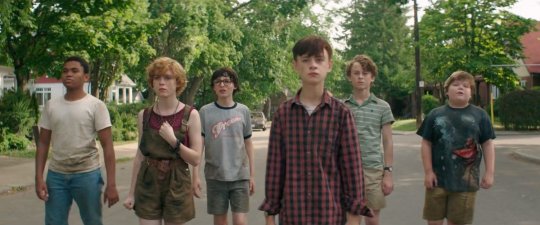
2) The Lucky Seven and their fears
Pennywise holds a specific talent for transformation; he’s the Boggart of the Stephen King realm. The new adaptation assigns each child new, different fears from the ones we’ve seen before. At one point, this displays a fear of clowns. One of our characters finds himself trapped in a room with countless clown toys, with one of them being an easter egg for the old film’s Pennywise look, portrayed by Tim Curry (We appreciate you for that, Andy Muschietti). The different fears gave viewers a new look at the horrors we would face and an almost new villain to battle.
3) Easter Eggsplosion
I personally appreciated the role Ben Hanscom played in this version. The book and Curry film portray Mike as our historical informant, but the remake casts the responsibility to Ben. This makes sense as he’s the established bookworm. The scene in the library illustrating the fatal Easter Egg hunt is a fabulous inclusion of former tragedy in Derry. Another appreciated allusion is the “I Heart Derry” shirt worn by Patrick Hockstetter (Owen Teague) in his final moments. But I’ll let you research that one on your own.
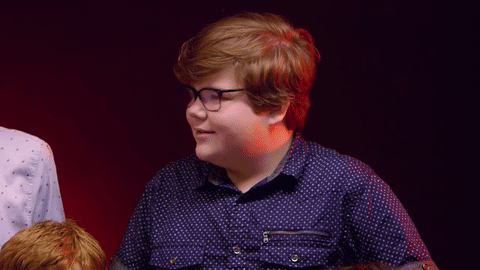
4) Historic Derry shift
It is crucial that the picture is painted of Derry as the monster itself. As we transition into Chapter 2, we will learn more about the inevitability of IT’s attacks and why the town’s adults have never stopped IT. Part of the evil is the town itself, and Chapter 1 does a fantastic job setting the stage for further development. That being said, Derry, Maine has always been understood as a small town with no connection to the outside world. There would be no famous study on its murder rates as explained by Ben. I believe this feature was placed for emphasis on the situation at hand, it’s just a potential plot hole because it’s opening up the possibility for national media involvement/investigation, versus a town “taking care of business” in its own coverup.
5) THE LEPER SCENE, OH MY GOD THEY KEPT IT.
This is beautiful, brilliant, and assigns the purpose of the Neilbolt house in ways it’s never been connected before.
6) Stand By Carrie?
Cinemania critic Irene Crespo implies the film was influenced greatly by one of King’s other stories, Stand By Me. In fact, one critic essentially boiled the film down to a statement: Stand By Me, Stranger Things, and The Goonies thrown into a blender and poured out as a poorly crafted cash grab. Ouch. But he has a point in that the film is almost more reminiscent of other works than its own roots.
Did anybody catch the Carrie-esque portrait drawn by Beverly’s sink-bomb experience? On a side-note, I also appreciate the inclusion from the book of her measuring tape riding the drain. The visual communicates the depth and reach of the monster’s pervasiveness, and adds choking suspense to the moment as it plays out.
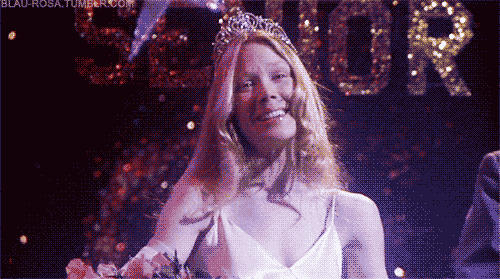
7) Lacking Origin
Disclaimer #2: I haven’t finished the book, but I’m working on it. The original film never gives us the origin story we typically need to understand our villain. I was disappointed when Chapter 1 didn’t take care of this problem; however, it almost did, and it still could! According to this Playback Podcast interview with Skarsgård, there was a highly disturbing scene regarding the backstory for Pennywise, but it was cut form the film. He said, “I'm not gonna spoil what the scene is, because we might use it... It’s a backstory...for what It is or where Pennywise came from. ... The idea is that It, the entity, was dormant or resting for thousands of thousands of years and it [the scene] hints on [the founding of Derry].” Apparently, the Fukunaga's script details an encounter with IT in the early 17th century, “where a mother allows the monster to devour her daughter in exchange for her safety. And like Skarsgård's description, this scene also featured a Pennywise unlike the one seen by the kids in the movie, describing IT as 'incomplete, his flesh pale and translucent, like a half-formed imitation of a human'” (Digital Spy).
Skarsgård took the role in stride, working to match the hype for former renditions of the Pennywise role. Perhaps one of the best inclusions is his otherworldliness, as described by Skarsgård in the Playback interview. “It’s a clown, but not a perfect clown. He glitches. He shuts down and freezes in a moment and he’s lost. My idea was that was the entity, who lives in this other sort of dimension, tapping in and out of these spaces.”
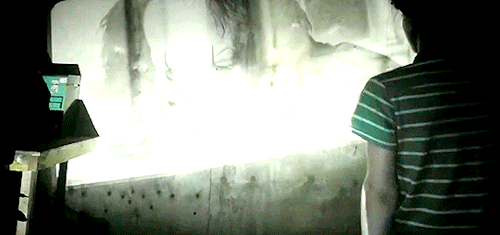
8) We all float down here.
I’m not going to lie, this line never made much sense in the former film; we see the webs and the bodies stored, but never truly connect the dots. The 2017 film takes it a step further by having the pile of victims, trophies and limbs eternally floating and winding around each other, almost in a way reminiscent of Dante’s Inferno. It was a literal translation of the bloodlust and attachment IT has to its victims.
Altogether, the film captures the beginnings of the Lucky Seven in a competent way. I stand with Sunday Times’s Tom Shone, who says the movie is “an amiable enough mixture of 1980s nostalgia, adolescent empowerment and R-rated frights that, for all their crunch, never quite put the shiver into your bones,” and still with Killer Movie Reviews’s Andrea Chase who believes while the movie “may lack the nuance and crescendos of a true horror classic, when it comes to zeroing in on the terror of a child’s helplessness, it has few peers.”
Ask me if I almost cried when I realized the adult characters were removed from this adaptation. The good news is we should see them in upcoming developments. While first time IT viewers will walk away with a newfound fear of clowns and pocket full of thrills, I would remind them this is not the story of Pennywise, the Dancing Clown and Father of Fears, but the story of seven losers who change the course of history with their love for one other, destroying inner and outward fears when they are faced with the decision that enough is enough.
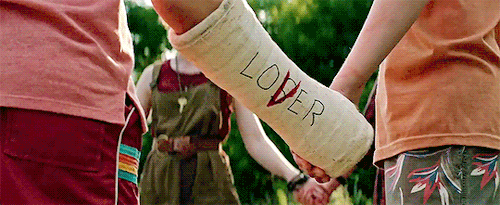
#IT#stephen king#horror#movies#film#tim curry#stranger things#the goonies#stand by me#carrie#losers club#loser#the losers club#review#flick#bill skarsgard#rotten tomatoes#finn wolfhard
20 notes
·
View notes
Text
Dear Papa Valentine: Your Girl Thanks You.
America celebrated another annual commercial holiday, yesterday: Valentine’s Day. There were many kinds of love expressed on my news feed, twitter threads, etc., A few examples include:
1) “Wow, my man is the greatest and we are the happiest.”

With those flowers and those chocolates? I don’t doubt it!
2) “Food is my actual soulmate.”

For the record, tacos always take highest priority.
3) “Oh wait, there’s a holiday today?”
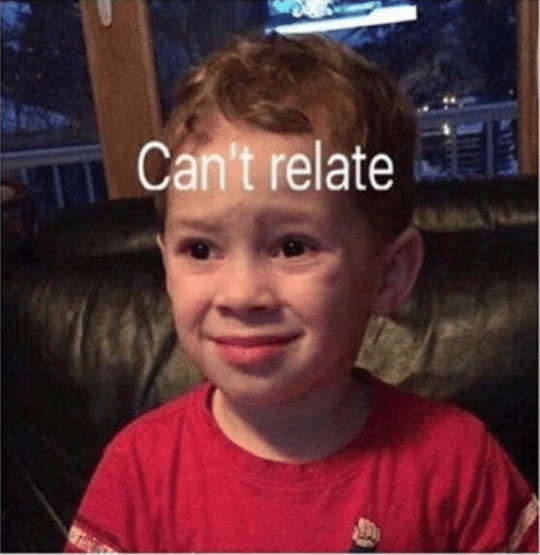
We hear you, singles that felt obliged to join the conversation.
4) “I’m too cool for social media bae bragging.”

Props to you for taking more time attending to your S.O. than to craft an aesthetic post about it.
I must admit that all these messages brought me joy. Some made me giggle, some must have been pretty deep, because I’M NOT CRYING; YOU’RE CRYING. Though Valentine’s Day is the greeting card industry’s second most successful American holiday, and can be a reminder to some of their solitary dating status, I have to admit it-- I will always enjoy celebrating love among the masses and peace among man. There is, however, one kind of Valentine’s post that will always tug my heart strings more than all others: The proud parent and his/her child-Valentine.
I will always remember my favorite Valentine’s Days growing up. I would walk in the door after a long day at school, and find that my first Valentine, Daddy, would have turned on a Norah Jones album and placed balloons on the counter with gift bags or cookie cakes for my mother, brother and me. Nothing made me happier than seeing my parents go out of their way to share a holiday typically celebrated by a couple with their sometimes (okay, often) bratty, needy child. My parents spent 18 years showing their love for me daily, between cooking dinner, taking me to sports practices and helping me learn how to live fully. I was ever impressed that on the day set aside to celebrate their marriage, their own unique relationship, they chose to celebrate me as well.
I am married now, and I have my own doting Valentine. I grew up dreaming of what he would look like, how he would greet me on this nationally recognized day of love. Would he, too, play Norah Jones and act as if my entrance was the best thing to happen all year? My dad might have exaggerated his welcome, but it lit up my little world. My husband is fun, special, and all the many things I could have dreamed of in my other half. But first came Papa Valentine.
This consumerist, artificial holiday never experienced a shallow moment in our household. My parents made sure that I knew on this day and all the others, I was loved immensely. I was taken care of, sheltered, and inspired to bloom independently. Valentine’s Day was never lonely, not even on the year I got dumped the week before the big day. Above all, I was reminded, at least at this time of year, that “a man” was no requirement for my happiness. This holiday served as a constant reminder that family was, and is, the heart of love.
In my mind, every Valentine’s day will be spent with “Don’t Know Why” stuck in my head, and my first waking thoughts will be of how I can share the same love with my new family that my parents showered over me. To all the Papa and Mama Valentines out there, thank you for your selflessness in sharing this day with your babies. Thank you for proving to us that love is not a feeling celebrated once a year (barring anniversaries) but a commitment and choice you have made to care for us, always.
#valentines#vday#vday2017#parents#papa#mom#dad#daddy#love#roses#b&w#journal#spilled ink#holiday#norah jones#couples#romance#marriage#dating#single
3 notes
·
View notes
Link
#disney#disney channel#dcom#dcomedit#disney movies#disney life#disney fans#funny#blog#humor#journal#odyssey#college#uni#university#freshman#sophomore#junior#senior#alumni#disney college program#movies#nostalgia#90s kid#90s
6 notes
·
View notes
Link
#cute#couple#relationship#the notebook#allie and noah#friends#rachel green#phoebe buffay#ross geller#monica geller#chandler bing#lilly and marshall#himym#the time traveler's wife#rachel mcadams#ryan gosling#emma stone#tv#movies#entertainment#pop#pop culture#engagement#wedding#boyfriend#girlfriend#he#she#him#her
1 note
·
View note